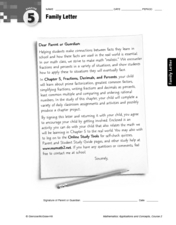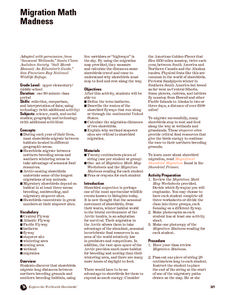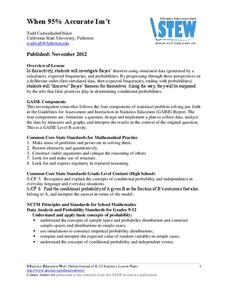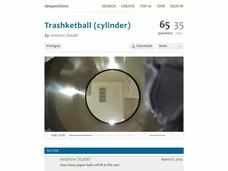Curated OER
Calculator Activity: Patterns
In this calculator activity worksheet, students learn to find patterns in numbers using the calculator. Students then use their calculator to or subtract the problems.
Curated OER
Calculator Activity: Temperature
In this calculator activity instructional activity, students learn to measure and find the temperature using a calculator. Students use the calculator to find the new temperature.
Curated OER
Calculator Activity: Time Flies
In this calculator activity worksheet, students learn how to use a calculator to find elapsed times. Students calculate the ending times using the given start times and elapsed times.
Curated OER
Calculator Activity: Number Groups
In this calculator activity worksheet, students use a calculator to learn to skip count and complete the sets of number groups.
Curated OER
Calculator Activity: Find the Path
In this calculator activity worksheet, students start at 0 and add the given numbers to find the path with the sum of 99. Students then color the path.
Curated OER
Calculating Probabilities: Introduction
Introduce your class to a sure-fire method for calculating probabilities. The method is described alongside several examples, then put into practice with a series of probability questions for the class to solve. This would be a great...
Curated OER
Calculating Your Foodometer
Students explore environmental issues by completing a food production class activity. In this carbon footprint lesson plan, students discuss the types of foods they eat, where they come from and what types of methods are used to...
Curated OER
Family Activity - Color by Numbers: Fractions, Decimals, and Percents
Learners solve four short answer problems. They determine the number of each color of candy or paper clip in a bag, and calculate the fractional, decimal, and percentage representation of the color compared to the total number of items.
Curated OER
Logic and Problem Solving: Math Hunt
In these math lesson plans, students discuss how math problems are written to reflect real-world situations. They complete an online Math Hunt using specific web tools, and work individually to create their own Math Hunts. Additionally,...
Curated OER
Interpret Clock Time
Save yourself a few minutes of planning with this elementary math lesson on elapsed time. Through a series of collaborative and independent learning activities, children explore different real-world situations as they learn how to...
Prince William Network
Migration Math Madness
A great way to incorporate math into life science, this lesson has learners measure migratory routes on a map and calculate the actual distance that shorebirds on the routes would cover. Learners compute the distance covered in both...
EngageNY
More on Modeling Relationships with a Line
How do you create a residual plot? Work as a class and in small groups through the activity in order to learn how to build a residual plot. The activity builds upon previous learning on calculating residuals and serves as a precursor to...
Illustrative Mathematics
The Lighthouse Problem
Long considered the symbol of safe harbor and steadfast waiting, the lighthouse gets a mathematical treatment. The straightforward question of distance to the horizon is carefully presented, followed by a look into the different...
Teach Engineering
Start Networking!
Class members create their own social networks by collecting signatures before graphing the interactions with their fellow classmates. The degree distribution of the simulated social network is determined by calculating the degree of...
Teach Engineering
Density Column Lab - Part 1
Mass and density — aren't they the same thing? This activity has groups use balance beams and water displacement to measure several objects. The pupils use the measurements to calculate the density of the objects.
Mathematics Vision Project
Module 1: Getting Ready Module
This fabulous resource is a must-have for any algebra teacher's arsenal of lessons. Developing the idea of equations and use of variables from basic physical scenarios, learners gain valuable intuition in the structure and meaning of...
Statistics Education Web
When 95% Accurate Isn’t
Investigate the effect of false positives on probability calculation with an activity that asks scholars to collect simulated data generated by a calculator. To finish, participants analyze the probability of certain outcomes which lead...
Illustrative Mathematics
How Many Cells Are in the Human Body?
Investigating the large numbers of science is the task in a simple but deep activity. Given a one-sentence problem set-up and some basic assumptions, the class sets off on an open-ended investigation that really gives some context to all...
Fall River Schools
Parabolas Are All Around Us
Moving parabolas off of graph paper and into the real world is the task at hand in this detailed poster project. First, learners perform a cumulative activity identifying many characteristics of an assigned quadratic equation. Next, they...
Illustrative Mathematics
How Many Buttons?
Bring the class into the probability by having everyone count buttons on their shirts. Organize the data into the chart provided and chose different possibilities such as "female with one button" or "all middle schoolers with more than...
101 Questions
Trashketball
Take a shot using a lesson on volume! Young learners watch a video showing a trashcan filling with paper balls. The task is to calculate the number of paper balls that will fit in the can. Pupils use volume calculations to make a...
Statistics Education Web
It Creeps. It Crawls. Watch Out For The Blob!
How do you find the area of an irregular shape? Class members calculate the area of an irregular shape by finding the area of a random sampling of the shape. Individuals then utilize a confidence interval to improve accuracy and use a...
EduGAINs
Discovery of Pi
Serve up a slice of math for Pi Day! A combination of fun, hands-on lessons and helpful worksheets encourage learners to practice finding the radius, diameter, and circumference of different circles.
Illustrative Mathematics
Tossing Cylinders
Everyone loves a lesson that involves throwing things around! To understand probability, your experimenters will predict how different cylinder-shaped objects will land when tossed. When the data is collected, they will calculate the...

























